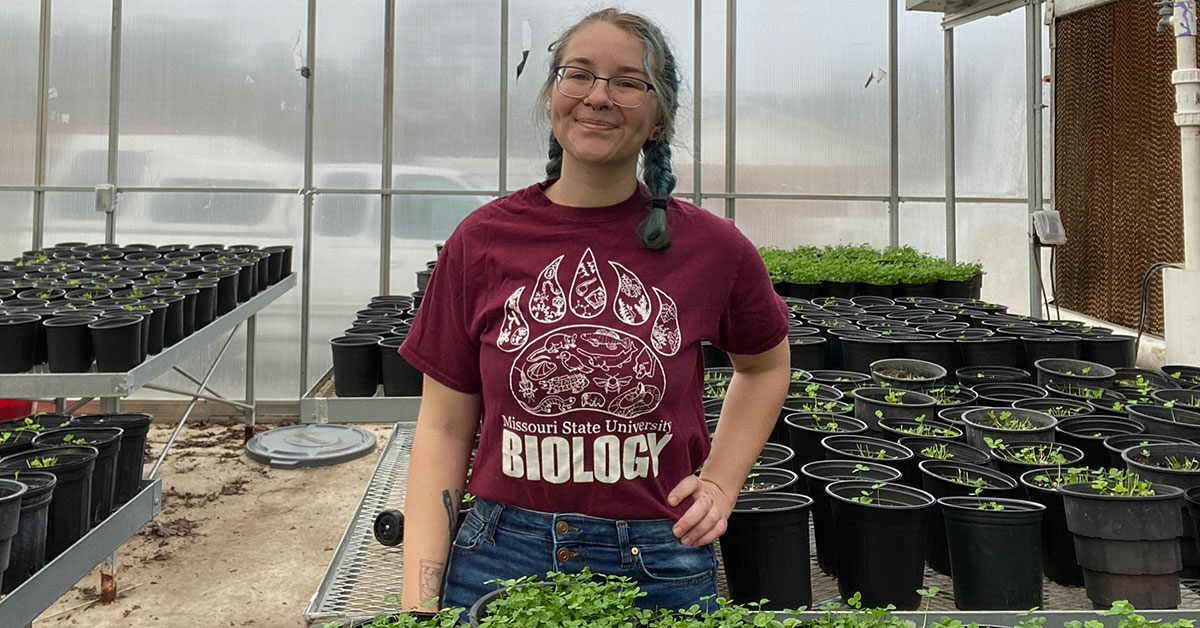Imagine a day-to-day life filled with adventure and purpose.
For Abilene Mosher, this means having a career where she can explore and protect “the great outdoors.”
Her love for nature and research made wildlife conservation and management a good fit for her.
“I learned that I really, really enjoy doing research, and I enjoy being outside. I wanted my job to be something outside,” Mosher said.
Initially, Mosher decided to attend Iowa State University, but she soon realized that she wanted to stay closer to her hometown of Odessa, Missouri.
Hearing about her friends’ plans to attend Missouri State, she jumped at the chance to join them.
“I had a good group of friends going. And all of us went into different majors and stuff, so none of us had classes together. But it was nice to have the familiarity. And only being two and a half hours from home was really great,” Mosher said.
Internship experiences reveal her true passion
Mosher entered college as a pre-vet biology major.
While in the honors program, Mosher took on an internship opportunity at the Dickerson Park Zoo, assisting the zookeepers and the zoo’s veterinarian.
While she enjoyed the learning experience, she discovered the emotional challenges that veterinarians face when working with animals and realized that the veterinary field wasn’t the ideal career path for her.
“Being able to do my internship the first year of undergrad and learn that what I thought I wanted to do since I was 10 years old was incorrect…that was crazy,” she said.
Questioning her future, she soon realized that her years of hoping to become a veterinarian would lead her to chase a new dream.
“The fact that they allowed me to do internships and do research – I think those two things really propelled me.”
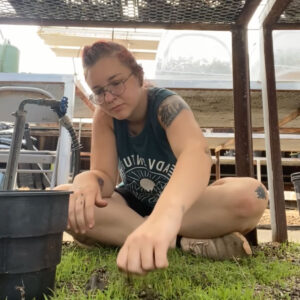
Supportive mentors help focus her career aspirations
Rethinking her degree plan, Mosher sought the guidance of her advisor, Dr. Avery Russell, an assistant professor in biology.
Mosher soon got involved in undergraduate research projects in Dr. Russell’s lab.
“Avery Russell is my saving grace. I took a semester off actually right before COVID hit,” Mosher said. “That worked out because he allowed me to keep working in his lab doing research (as much as I could with COVID). So that convinced me to come back and finish my degree.”
Her newfound research skills shone a light on her professional interests.
“I just love that I was able to do my own project, and that I had so much say in the research I was doing and the work I was putting in,” she said.
Mosher also found a kindred spirit in Dr. Debra Finn, associate professor in biology, due to Finn’s insight inside and outside of class.
“Debra Finn is actually the person who I first met at MSU that really inspired me to continue with biology,” Mosher said.
Mosher’s research in Roy Blunt Hall also put her under the supervision of Angela Goerndt, manager of animal research facilities.
“I worked at the vivarium all four years at MSU, and I took care of research rats. And she was my manager the entire time. She really pushed me to keep doing things and to be where I am today,” Mosher said. “She was really awesome. She was a big support system for me.”
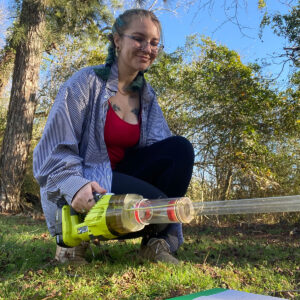
Catching bees all summer long
Mosher took on a summer research position in the forestry department at Oregon State University in 2021.
“I was just catching bumblebees all summer. It was as cool as it sounds,” Mosher said. “It was really hard work. We were hiking 10-plus hours a day catching bumblebees. It was to determine how the logging in the area was affecting bumblebee populations.”
Upon returning to Missouri State, Mosher thrived in her studies when she switched her major to wildlife conservation and management.
“I was able to really fix my schedule to be exactly the classes that I thought would benefit me, and I really enjoyed that,” she said.
For almost three years, Mosher conducted extensive research to uncover a chemical that is emitted by anthers, the pollen-producing part of a flower.
She concluded that the chemical from the anther triggers a natural response in bumblebees called buzz pollination, where bees will shake their abdomen to release and collect pollen.
“I love this work. I love that I got to do outside stuff. Doing research. Hands-on things that are helping conservation.”
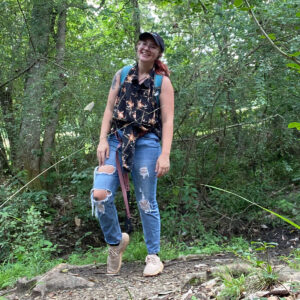
Resilience pays off at research conferences
Throughout her time at MSU, Mosher was awarded research grants from the TriBeta National Biological Honor Society to continue her independent research, and she presented her findings at many conferences.
In 2020, she won second place in the CNAS Undergraduate Research Symposium in the biology (ecology/wildlife/conservation) category for her presentation on the pollinating chemical “cues” produced by anthers.
Most memorably, she managed to attend her very first conference – the Society of Integrative and Comparative Biology Conference in Phoenix, Arizona – in a wheelchair after recovering from back surgery.
“It was a really crazy experience, but I do think that made me feel most accomplished because 1) it was my first conference and 2) I was battling with my body, essentially,” Mosher said.
“The fact that I did it and all my labmates and my advisor were all there for me cheering me on, it was an amazing experience.”
With almost three years of research invested in her pollinator project, Mosher wrapped up her studies and graduated in December 2022.
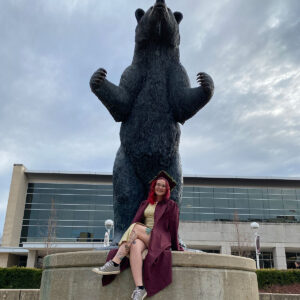
Envisioning a greener future
Mosher recently celebrated her first year as a lab manager at Auburn University in Alabama.
“I’ve learned so many things being here. I enjoy the people that I work with,” Mosher said.
Currently, she is undertaking a project that explores the benefits of weed-like plants (e.g. clover and dandelions) in lawns and their effects on pollinators.
Already planning ahead, she is looking into graduate programs to pursue her master’s degree in 2025 and is keeping her eyes open to future career opportunities with the USDA.
Mosher aims to further conservation efforts by doing what she loves most: researching and exploring the natural world.

